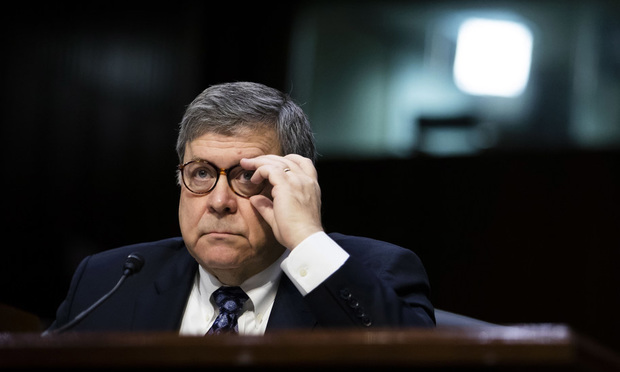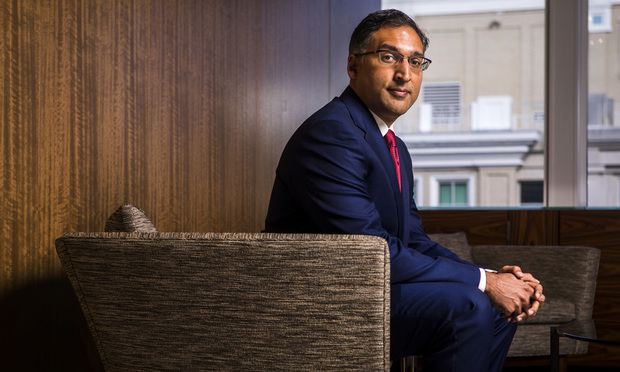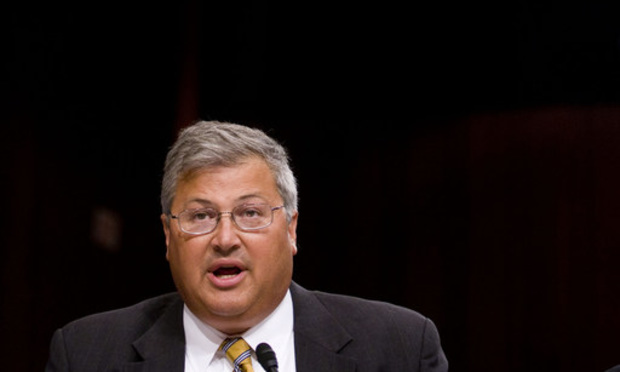'Stormy Weather Lies Ahead': What Lawyers Are Saying About Barr's Obstruction Call
U.S. Attorney General William Barr's decision to resolve whether Trump committed obstruction of justice amid the Mueller probe set off a firestorm of debate among legal scholars and practitioners. Here's a snapshot of what lawyers are saying.
March 25, 2019 at 11:24 AM
7 minute read
 William Barr testifies before the Senate Judiciary Committee during his confirmation hearing on Jan. 15, 2019. (Photo: Diego M. Radzinschi / ALM)
William Barr testifies before the Senate Judiciary Committee during his confirmation hearing on Jan. 15, 2019. (Photo: Diego M. Radzinschi / ALM)
President Donald Trump and his supporters boasted Sunday of a “total and complete exoneration” by the special counsel investigating Russia's ties to his 2016 presidential campaign, but that wasn't entirely the case—at least when it comes to whether the president tried to obstruct the special counsel's investigation.
U.S. Attorney General William Barr, consulting with Rod Rosenstein, his deputy, determined there was insufficient evidence to show the president obstructed justice during special counsel Robert Mueller's 22-month-long probe. Mueller laid out the arguments for both sides—in a word, “punting,” as many commentators called it. Mueller did not find evidence supporting a conspiracy between the Trump campaign and Russians to meddle in the election.
Lawyers following the investigation said the lack of a decisive answer from Mueller on whether the president obstructed justice indicates the special counsel's team perhaps was divided. Or that Mueller recognized the futility of such a conclusion either way, considering that Justice Department policy recommends against charging a sitting president.
“Our determination was made without regard to, and is not based on, the constitutional considerations that surround the indictment and criminal prosecution of a sitting president,” Barr wrote.
Practitioners and legal scholars took the airwaves Sunday and Monday and wrote online, about whether and how Barr's decision on Trump and obstruction was the right call. Meanwhile, U.S. House Democrats are preparing to push for the full Mueller report—to see what the special counsel himself had to say about the evidence for and against the president.
Here's a snapshot of some things legal scholars are saying about Barr's momentous conclusion about obstruction:
>> Ken Starr, former Whitewater independent counsel: “Mueller's decision not to make a determination on possible obstruction of justice by President Trump suggests the likelihood of a division of opinion within the special counsel's ranks. The result of that 'house divided' is that Mueller washed his hands of the issue.” Starr also wrote: “Stormy weather lies ahead, as the battle over what the evidence of obstruction is and what it means.” [Fox News]
 Neal Katyal, partner with Hogan Lovells in Washington, D.C., Oct. 30, 2017. (Photo: Diego M. Radzinschi / ALM)
Neal Katyal, partner with Hogan Lovells in Washington, D.C., Oct. 30, 2017. (Photo: Diego M. Radzinschi / ALM)>> Neal Katyal, former acting solicitor general now at Hogan Lovells: “Such a conclusion would be momentous in any event. But to do so within 48 hours of receiving the report (which pointedly did not reach that conclusion) should be deeply concerning to every American. The special counsel regulations were written to provide the public with confidence that justice was done. It is impossible for the public to reach that determination without knowing two things. First, what did the Mueller report conclude, and what was the evidence on obstruction of justice? And second, how could Mr. Barr have reached his conclusion so quickly?” [NYT]
>> Shanlon Wu, former lawyer to Rick Gates: “On obstruction of justice, Barr's summary raises more questions than it answers since it includes the troubling quote from Mueller that 'while this report does not conclude that the President committed a crime, it also does not exonerate him.' A statement of non-exoneration is enormously damning coming from the taciturn Mueller, and the president's actions that led to the concerns about obstruction, many of them public, again demonstrate deeply troubling conduct.” [CNN]
>> Rudy Giuliani, lawyer to President Trump: “Now the question is if there were three investigations—no evidence of collusion—who made it up? It didn't just come out of thin air. I want to know who did it. Who paid for it? Who fueled it? Because the person that did it, and the group that did it, knows it's untrue because they invented it.” [Fox & Friends]
>> Robert Bauer, former Obama White House counsel: “The attorney general's involvement in the final decision on potential obstruction of justice is more questionable. After all, Mr. Barr's views were well known to the White House on this topic: He did not bring an open mind to it.” [NYT]
>> Alan Dershowitz, Harvard Law School: “[T]wo cheers for Special Counsel Robert Mueller. He came to the right conclusion about Russia—there was no collusion between Trump, his campaign or associates with Russia to win the election. Mueller seems to have conducted a generally fair investigation. But he failed to come to a clear decision about obstruction of justice. That was his job and he should have done it.” [Fox News]
 Jack Goldsmith, testifying in 2010. (Photo: Diego M. Radzinschi / ALM)
Jack Goldsmith, testifying in 2010. (Photo: Diego M. Radzinschi / ALM)>> Jack Goldsmith, Harvard Law School: ”A second difficult issue of law is that most, if not all, of Trump's alleged acts of obstruction were intimately tied to his constitutional powers as Chief Executive and as the leader of U.S. foreign policy. Any prosecution for obstruction of justice would have had to contend with serious constitutional objections, based on Presidential power, and hard statutory questions, based on these constitutional issues. In light of these legal uncertainties, plus unspecified factual ones, Mueller made the reasonable call to leave the question of whether a President obstructed justice to the head of the Justice Department, the Attorney General.” [The New Yorker]
>> Gene Rossi, Carlton Fields: “I am definitely questioning Attorney General Barr's decision to decide the obstruction issue. He should have recused himself. He should not have decided the obstruction issue. He should have been purer than Caesar's wife. June of last year he wrote a 20 page memo saying there was no obstruction.” [Bloomberg]
>> Marty Lederman, Georgetown University Law Center: “There was no apparent justification for Barr to opine on whether Trump's conduct met all the elements of an obstruction offense, other than to give Trump a political boost. Given that there'd never be an obstruction prosecution, Barr's legal assessment doesn't tell us anything of relevance—the facts are what they are, and Barr thus should have done what Mueller did, i.e., leave it to Congress and the public to assess their significance.” [Just Security]
>> Jessica Levinson, a professor at Loyola Law School in Los Angeles: “You do not need to prove an underlying crime to prove obstruction of justice. Martha Stewart is quite aware of this fact.” [The Washington Post]
>> Elizabeth de la Vega, former federal prosecutor: “Mueller did not punt. Indictment was not possible because of DOJ policy, so any judgment on the obstruction issue would be up to Congress. He laid out the facts/arguments that bore on the question for Congress. Nothing in the regs allowed Barr to manipulate Mueller's findings. [Twitter]
Read more:
READ: Here Are Mueller's 'Principal' Findings in Russia Investigation
The Mueller Probe Was a Gift to the White-Collar Bar
New FOIA Lawsuit Demands Release of Mueller Report
William Barr Fills Front Office With Trump White House Lawyers
This content has been archived. It is available through our partners, LexisNexis® and Bloomberg Law.
To view this content, please continue to their sites.
Not a Lexis Subscriber?
Subscribe Now
Not a Bloomberg Law Subscriber?
Subscribe Now
NOT FOR REPRINT
© 2025 ALM Global, LLC, All Rights Reserved. Request academic re-use from www.copyright.com. All other uses, submit a request to [email protected]. For more information visit Asset & Logo Licensing.
You Might Like
View All
DC Circuit Rejects Jan. 6 Defendants’ Claim That Pepper Spray Isn't Dangerous Weapon

Supreme Court May Limit Federal Prosecutions Over 'Misleading' but True Statements

US Judge OKs Partial Release of Ex-Special Counsel's Final Report in Election Case
3 minute read
11th Circuit Rejects Trump's Emergency Request as DOJ Prepares to Release Special Counsel's Final Report
3 minute readTrending Stories
Who Got The Work
J. Brugh Lower of Gibbons has entered an appearance for industrial equipment supplier Devco Corporation in a pending trademark infringement lawsuit. The suit, accusing the defendant of selling knock-off Graco products, was filed Dec. 18 in New Jersey District Court by Rivkin Radler on behalf of Graco Inc. and Graco Minnesota. The case, assigned to U.S. District Judge Zahid N. Quraishi, is 3:24-cv-11294, Graco Inc. et al v. Devco Corporation.
Who Got The Work
Rebecca Maller-Stein and Kent A. Yalowitz of Arnold & Porter Kaye Scholer have entered their appearances for Hanaco Venture Capital and its executives, Lior Prosor and David Frankel, in a pending securities lawsuit. The action, filed on Dec. 24 in New York Southern District Court by Zell, Aron & Co. on behalf of Goldeneye Advisors, accuses the defendants of negligently and fraudulently managing the plaintiff's $1 million investment. The case, assigned to U.S. District Judge Vernon S. Broderick, is 1:24-cv-09918, Goldeneye Advisors, LLC v. Hanaco Venture Capital, Ltd. et al.
Who Got The Work
Attorneys from A&O Shearman has stepped in as defense counsel for Toronto-Dominion Bank and other defendants in a pending securities class action. The suit, filed Dec. 11 in New York Southern District Court by Bleichmar Fonti & Auld, accuses the defendants of concealing the bank's 'pervasive' deficiencies in regards to its compliance with the Bank Secrecy Act and the quality of its anti-money laundering controls. The case, assigned to U.S. District Judge Arun Subramanian, is 1:24-cv-09445, Gonzalez v. The Toronto-Dominion Bank et al.
Who Got The Work
Crown Castle International, a Pennsylvania company providing shared communications infrastructure, has turned to Luke D. Wolf of Gordon Rees Scully Mansukhani to fend off a pending breach-of-contract lawsuit. The court action, filed Nov. 25 in Michigan Eastern District Court by Hooper Hathaway PC on behalf of The Town Residences LLC, accuses Crown Castle of failing to transfer approximately $30,000 in utility payments from T-Mobile in breach of a roof-top lease and assignment agreement. The case, assigned to U.S. District Judge Susan K. Declercq, is 2:24-cv-13131, The Town Residences LLC v. T-Mobile US, Inc. et al.
Who Got The Work
Wilfred P. Coronato and Daniel M. Schwartz of McCarter & English have stepped in as defense counsel to Electrolux Home Products Inc. in a pending product liability lawsuit. The court action, filed Nov. 26 in New York Eastern District Court by Poulos Lopiccolo PC and Nagel Rice LLP on behalf of David Stern, alleges that the defendant's refrigerators’ drawers and shelving repeatedly break and fall apart within months after purchase. The case, assigned to U.S. District Judge Joan M. Azrack, is 2:24-cv-08204, Stern v. Electrolux Home Products, Inc.
Featured Firms
Law Offices of Gary Martin Hays & Associates, P.C.
(470) 294-1674
Law Offices of Mark E. Salomone
(857) 444-6468
Smith & Hassler
(713) 739-1250










